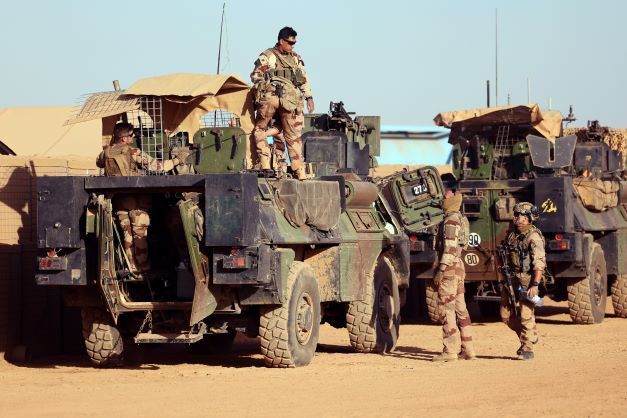- Home
- Middle East
- Benin Bets on Free Vets and Schools to Turn People Away From Jihadism

Between massacres and local agreements, JNIM seeks to position itself as a credible alternative to Sahelian states ©AFP
In jihadist-threatened north Benin, the army is waging a campaign away from the front -- a program of social projects, including free veterinary care, to tempt locals away from extremism.
Located just south of Niger and Burkina Faso -- which together with neighboring Mali form an alleged terrorism epicenter -- Benin's north has come under increasing pressure from Islamist extremists, many of them linked to Al-Qaeda.
Besides fighting off the militants, the 3,000 Beninese soldiers deployed to the region have worked to win the trust of northern communities both threatened by the jihadists' advance and courted by well-funded Islamist groups.
In May, the army provided free treatment to more than 4,000 cattle belonging to herders in the Materi commune and delivered medical care to 1,700 patients in another village in the Atacora region bordering Burkina Faso.
"These projects show an obvious desire to restore trust between the defense forces and communities," Lieutenant-Doctor Mardochee Avlessi said in early June.
The army medic, who is in charge of a joint civilian-military committee in Materi, said the army wanted to work in the "spirit... of building security together".
In this, the west African country hopes to learn from the errors of its neighbors in the Sahel -- the army cannot root out jihadism by itself.
Feeling abandoned
Part of the problem is the lack of development in the region.
"The places which are the most insecure are the least developed in Benin," Mathias Khalfaoui, a specialist in west African security, told AFP.
And as the United Nations points out, Benin's north is the least developed part of the country.
Jihadists are winning over hard-up communities with cash, rather than ideological or religious arguments, a UN report dated May argued.
"In exchange for supplies and information, terrorist groups offer money to young locals," the report found.
The most influential Islamist group in the north is the Al-Qaeda-affiliated Group for the Support of Islam and Muslims, known by its Arabic acronym JNIM.
By exploiting local frustrations, the JNIM has managed to rally Beninese to its cause after years of working to establish itself in the north.
"If we do not bring a response from the state and public services in these regions, where there is already a local sentiment of sometimes feeling perhaps a bit abandoned, it's certain that the fight against jihadism will become impossible," said Khalfaoui, the security researcher.
Besides jihadists putting down local roots, the suspension of military cooperation between Benin and Niger and Burkina Faso has helped fighters launch ever-increasing assaults.
Benin experienced its first jihadist raids in 2021.
Within three years, the deaths had piled up, with jihadists killing 173 people in 2024, according to the UN report.
Providing a future
To develop social projects in the north, Benin has also received help from the international community.
In Atacora and the neighboring Donga commune, the French Acting for Life charity trains young Beninese in masonry and eco-friendly construction to help them find work.
"To best occupy the young, you have to train them and above all bring them into working life," Abdoulaziz Adebi, the executive director of the association in charge of the project, told AFP.
"I have a future with this training," said Boukary Moudachirou, a young person supported by the charity who hails from Djougou, north Benin's most Muslim commune.
"Now we know there are good things we can do and move away from certain things," he told AFP.
But observers fear the state's social initiatives and the army's program of well-digging and school-building will be too small to fulfil the growing needs of the north's people.
The army's ability to fight jihadists will remain limited without effective collaboration with Niger and Burkina Faso, with both of whom Benin is locked in a diplomatic spat.
"No state authority is present at the border of Burkina Faso, where the territory is controlled by armed groups, while Niger has closed its borders with Benin," the UN has warned, worried that deals between the neighbors allowing the army to pursue jihadists are no longer in force.
Of further concern, given what is happening on its other frontier with Nigeria, where jihadists and criminal gangs have committed murderous attacks, "Benin has a larger area to defend," added security researcher Khalfaoui.
Another UN report from February found that the JNIM was looking to advance towards Nigeria from north Benin and had linked up with Ansaru, a Nigerian jihadist group which splintered off from Boko Haram.
Other countries in the region threatened by jihadists, such as Senegal, Ivory Coast, Ghana and Mauritania, have likewise looked to development as a means to stave off unrest.
With AFP
Read more



Comments